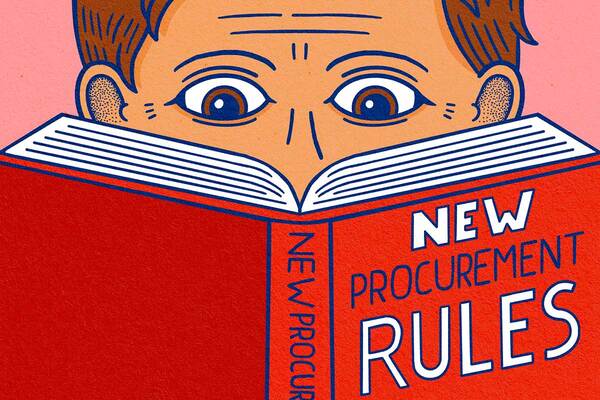What small landlords need to consider to make public procurement work
Only large associations can afford the specialists required by changing rules, so smaller groups must collaborate, says SEC’s David Ashby

In association with:

Efficient, cost-effective procurement is crucial to the long-term success of organisations across the housing sector. The government’s plans for public procurement mean housing providers will need to change the way they do things, but how will these changes affect smaller housing associations? And how can they adapt best? Inside Housing spoke to David Ashby, head of operations at South East Consortium (SEC), the procurement alliance, to find out.
What’s different about procurement for smaller housing associations?
Smaller associations have a small team, and those team members have to do a bit of everything. So they haven’t really got specialists in a number of areas, such as procurement, like some of the larger housing associations do. This means they tend to need a bit more support around meeting legislation and also around some of their documents, such as writing specifications, price models or contracts.
How are the incoming changes to procurement law going to affect smaller organisations in particular?
The most impact is going to be felt where the government is calling for high levels of competency and capability, and – linked back to the fact that they don’t have those specialist roles – that’s going to be a major problem. They’ll need to look at working together or working with organisations like us that provide procurement frameworks – central purchasing bodies, in other words. There is a bit of a drive in the new legislation to make more use of those.
The government has produced a Construction Playbook, which is a set of guidance around best practice. It says that using central purchasing bodies, or frameworks, is an efficient way of moving forward – not for every single scenario, but certainly where some things have already been pre-procured.
Using a central purchasing body means they will already have met the legislation under public contract regulations. So it’s a good idea to piggyback on those pre-set-up agreements rather than reinventing the wheel all the time.
I think that’s particularly useful for smaller housing associations, because they don’t have the specialists in-house, and preparing procurement documents from scratch all the time is quite a task.
What are the opportunities for smaller organisations in using central purchasing bodies?
There are definitely some opportunities. For instance, we currently have research groups looking into building safety, better information management and sustainability, so that we can produce guidance and reports around how people can get the best out of their procurement in those areas. Smaller organisations can really benefit from that information.
One of the things we’ve worked on – it’s been live since 1 September – is a dynamic purchasing system (DPS). This is specifically aimed at smaller housing associations and smaller contractors.
The idea is that if someone wants some responsive repair work, kitchen replacements or small-scale planned maintenance work – that sort of thing – then they can use this DPS. The difference between this approach and a framework is that the latter is set for four years; you can’t add new contractors to it, and you have to link back to its specifications. With a DPS, suppliers can be added on at any time, and the specification is done at the tender stage, which makes it more flexible for smaller housing associations. They are able to use a network of smaller contractors, because the latter can apply to and join the DPS at any time.
Something else we’re thinking about doing, which is a bit of an innovation, is providing a critical friend role, sitting down with someone and saying, “Tell me all the issues you have with a specific project, or projects, and let’s talk about the options you have and how to move forward.” That sort of support is a real opportunity for smaller housing associations to start thinking more collaboratively; to work together and pool some of their resources.
David Ashby is head of operations at SEC. As a chartered building surveyor and fellow of the Royal Institution of Chartered Surveyors, he has been in construction for more than 40 years, and housing for more than 30.
He has worked for landlords at many levels, from surveyor through to head of service within asset management, including managing leaseholder consultation requirements. He leads all of SEC’s procurement frameworks, bespoke work and its DPS.
How else might joint procurement help smaller associations? How should they think about this?
As a practical example, consider that a small housing association – one with, say, 1,000 units – is not going to be able to employ the services of a chartered building surveyor or a chartered building services engineer, but they might be able to afford it by sharing that resource with two or three other organisations.
Or, if you’re going to be checking the work the contractors are doing, if you’re going to be making sure that payments and things like that are being done properly, then instead of paying for a contract administrator five days a week, you can share that cost 50-50 with another organisation and employ a better qualified contract administrator. It makes the costs manageable.
As far as contracting costs go, you can end up getting a better deal from a particular contractor because you’ve got better resources. If you’re going to have someone dealing with 10 properties scattered around a large area, then there is a lot of downtime in getting between those properties. But if you can work with another organisation and double that number of properties, there’s less downtime because the contractor can go next door rather than another couple of miles away.
That is one of the really big benefits – the improved quality of oversight collaborating organisations can afford to pay for. It’s where a lot of smaller organisations are missing out. They might have a housing manager running a construction contract, who is skilled in their area but who might not know the details around construction, procurement or the regulations.
How much scope is there for smaller organisations to work together like this? What are the challenges?
The biggest challenge is that different organisations have very different ways of dealing with things. Getting your head around doing things collaboratively means compromising on how things are done. Everyone likes the idea of working together, because they can see the benefits of doing so. The barrier appears when one party thinks, “Well, if everyone does it my way, it works”, but then the other organisation has the same view!
What’s the solution?
It’s not just the principle of working together, it’s about understanding the mindset that, in order to get these benefits, these are the compromises you need to talk about. This can be done on a project-by-project basis, and very often it is easier for organisations to get their head around this on a smaller project rather than trying to aim for the stars. So try and break it down into chunks; start with something a bit simpler. Get that working. And once they’ve got the confidence that it can work, then they can take it to the next stage.
It can be difficult, and often it takes that critical friend role I mentioned earlier to sit down with them, outline the benefits, and ask, “Are you really willing to deal with these challenges?”
But the benefits are certainly worth it.











